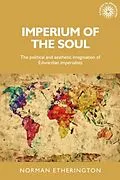Some of the most compelling and enduring creative work of the late Victorian and Edwardian Era came from committed imperialists and conservatives. Their continuing popularity owes a great deal to the way their guiding ideas resonated with modernism in the arts and psychology. The analogy they perceived between the imperial business of subjugating savage subjects and the civilised ego's struggle to subdue the unruly savage within generated some of their best artistic endeavours. In a series of thematically linked chapters Imperium of the soul explores the work of writers Rudyard Kipling, Joseph Conrad, Rider Haggard and John Buchan along with the composer Edward Elgar and the architect Herbert Baker. It culminates with an analysis of their mutual infatuation with T. E. Lawrence - Lawrence of Arabia - who represented all their dreams for the future British Empire but whose ultimate paralysis of creative imagination exposed the fatal flaw in their psycho-political project. This transdisciplinary study will interest not only scholars of imperialism and the history of ideas but general readers fascinated by bygone ideas of exotic adventure and colonial rule.
Autorentext
Norman Etherington
Klappentext
Imperium of the soul offers a new interpretation of the creative work of some of the most well-known British imperialists, including Rudyard Kipling, Joseph Conrad, John Buchan, Edward Elgar, Rider Haggard and Herbert Baker. Despite their association with obsolete and discredited political creeds, the creative work of these individuals continues to captivate new generations of readers and critics. This interdisciplinary study considers their enduring fascination, with part of the explanation to be found in the way they played with the notion of the divided psyche made popular in their time by the revolutionary psychoanalytic theories of Sigmund Freud. Each of them perceived a powerful analogy between the real-world project of imposing imperial rule on 'savage subjects' and the struggle of individual egos to keep a lid on savage impulses percolating up from the subconscious. Much of the power of their creative work derives from their exploration of this oddly thrilling and disturbing notion that the most cultivated and civilised Europeans harboured deep within themselves wildly transgressive desires that might be repressed but never purged. Their deeply held conservative political allegiances have tended to obscure the many ways in which the subjects of this book shared key ideas of twentieth-century modernism. In a series of thematically linked essays, Imperium of the soul explores the work of each of the major figures, to understand how their work was enriched and deepened by the intersection of their beliefs about politics, empire and the human psyche. A final chapter explains why these men placed their faith in Lawrence of Arabia and why he was unable to realise their impossible dream of an imperial ruler who merged his identity with subject peoples. The book is written in an accessible style that will appeal to general readers interested in adventure and colonial rule, as well as to specialists and scholars in the field of imperialism.
Inhalt
Introduction 1. Rider Haggard, imperialism and the layered personality 2. Love and loathing: Rudyard Kipling's India 3. How Herbert Baker created an architecture of imperial power 4. Joseph Conrad: Kipling's secret sharer 5. Elgar and the Gordon Symphony 6. John Buchan and the loathly opposite 7. Lawrence of Arabia: great white hope of the Edwardian imperial romancers Epilogue: The death-knell of the imperial romance and imperial ruleIndex
